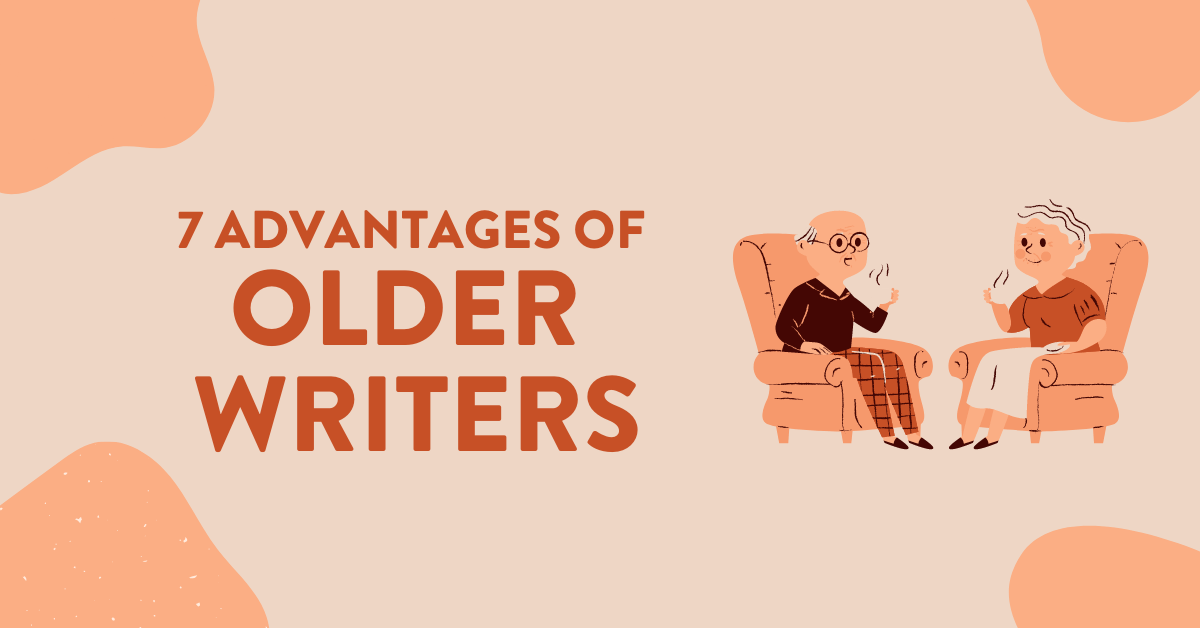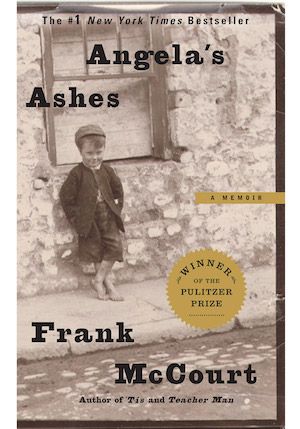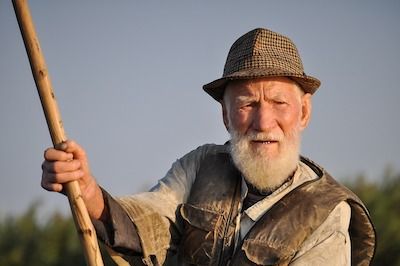 Have young people cornered the market on writing?
Have young people cornered the market on writing?
I only ask because it seems like the big publishing companies tend to reward the prodigy model: you know, the wunderkinds who graduate from a prestigious university and get a seven-figure advance for a novel about New York or a YA fantasy series.
They have cherubic cheeks and photograph well for all the media outlets and act like very intellectual twenty-five-year-olds.
I almost never hear about big advances or news for writers 50 or older who are publishing their first book.
What hope do writers have who started writing later in life, perhaps as a second career, or in retirement?
 Is it possible to have a good career? Is it possible to find a traditional publisher who will take a risk on an older writer?
Is it possible to have a good career? Is it possible to find a traditional publisher who will take a risk on an older writer?
Now, there are plenty of writers who started late, and I bet you can name a few of them:
- Sam Savage published his first book when he was 65, and his second book when he was age 66 (the second, Firmin, made him internationally famous).
- Laura Ingalls Wilder was age 64 when she published her first book. She was 76 when she finished the last book in her Little House on the Prairie Series.
- Frank McCourt published Angela’s Ashes at age 66 (retired).
- Anna Sewell published ‘Black Beauty’ at age 57, just before she died.
But are these the exception rather than the rule? If you start later in life, are you just hopelessly disadvantaged and fighting an uphill battle?
Well, not necessarily.
7 Advantages of Late-Blooming Writers
1. There are no expectations for older writers.
 It’s weird to understand that having audience expectations can cripple your writing.
It’s weird to understand that having audience expectations can cripple your writing.
But writers trying to write their sophomore book talk about this all the time. For their debut novel, they wrote whatever they wanted to, and that freedom resulted in a better book. It can be stifling to write toward an audience and be afraid of failure, that those people who liked the first book won’t like this one.
So when you have no audience, and no expectations on your work, you can be absolutely free to follow your imagination and write whatever you want to write.
2. Older Writers have the Wisdom of Age
 Think about all the life experience you have over many young and middle-aged writers. Think about how well you can portray any stage of life, because you’ve lived through most of them!
Think about all the life experience you have over many young and middle-aged writers. Think about how well you can portray any stage of life, because you’ve lived through most of them!
Older writers have a depth of experience — relationship experience, especially — that they can draw upon. They’ve known more characters in real life and can draw from more years of life.
If you’ve divorced and remarried, or seen your children grow up, or lost a child to cancer — these are all life experiences that you can channel into your writing, and your writing will be more powerful because of it.
3. Older Writers have a Reading Bank
 There’s a saying that you have to read 1000 books to write 1 book. And I think that’s mostly right.
There’s a saying that you have to read 1000 books to write 1 book. And I think that’s mostly right.
You have to internalize the storylines and sentences of so many great writers who have come before you before you accomplish what they have accomplished.
For many younger writers, maybe they haven’t even read a thousand books in their whole life! (at 50 books a year, it would take 20 years to get there). But if you’ve been a reader your whole life, by the time that you reach 50 or 60, you have a reading bank that you can draw from when writing your book.
Don’t discount that experience with the written word. It can’t be faked and it can’t be artificially gained.
4. Older writers tend to be less idealistic.
 Yes, this is a good thing, because idealism can be a problem. And I can give you many examples.
Yes, this is a good thing, because idealism can be a problem. And I can give you many examples.
I can’t tell you how many younger writers only want to be rich and famous. And that desire for riches and fame ends up ruining their writing career, either because they’re disappointed and end up quitting writing, or because their writing changes to try to achieve riches and fame, and that warps their writing.
If you’ll allow me the generalization, I find that older writers tend to have more realistic ideas about the likely result of their book. They know that it will probably have a small audience, and they’re fine with that, because often it’s more about personal fulfillment than becoming Kardashian-famous or J.K.-Rowling-rich.
And with more sensible expectations for their book, they can create the type of book that only they can create, a book that truly showcases their brain and their experiences, and that is actually what people really want to read.
5. Most writers starting later in life don’t have dire financial pressures.
 Many writers in their 20s are just scraping by, working two jobs and eating baloney sandwiches. All of their brain energy is going toward how to get money for rent.
Many writers in their 20s are just scraping by, working two jobs and eating baloney sandwiches. All of their brain energy is going toward how to get money for rent.
While those over 50 often have a steady career, or their spouse does. Maybe you’ve already retired and are looking to write the novel you’ve always wanted to write.
It’s hard to overestimate what that financial freedom does for the brain. It opens up all these creative juices because you’re not worried about making rent or where your next meal will come from.
Remember that good writing comes from a bored brain. I mean, people who constantly on social media and watching television and entertaining themselves with all the distractions that our culture offers do not write masterful works of the imagination. And having financial security means you can let your brain get bored enough that you can write.
6. Older Writers often know exactly what they want to write.
 Younger writers can spend five or ten years flailing about to figure out what exactly their topic is.
Younger writers can spend five or ten years flailing about to figure out what exactly their topic is.
Do they write about sibling relationships? Or mother/daughter relationships? Do they have the skill set for espionage novels or historical fiction?
It just takes time to determine their writing strengths and weaknesses, to determine the best genre for them, and what they actually enjoy writing.
In my experience with editing older writers, they’ve almost always moved past all that exploration and intellectual feints in one direction and then another, and they’ve really honed in on the book and genre they want to write.
Maybe they’ve been thinking about it for a decade or more. Maybe they’ve been reading extensively in that genre and know that there’s nothing else they want to write.
That targeted focus is very often beneficial for writers starting later in life. It means they can sit down and create what they want to create with more speed and precision.
7. Many writers over 50 usually aren’t caring for young children.
 Raising young children is one of the most difficult and time-consuming jobs in life, and for most older writers, that time is over.
Raising young children is one of the most difficult and time-consuming jobs in life, and for most older writers, that time is over.
By the time you’re getting advanced in years, if you have kids they’re often at the age when they’re more self-sufficient, or maybe they’ve moved out of the house. Plus, careers have settled into comfortable patterns. So ultimately, many people find that they have more free time than a decade or two before.
So if you choose, you can devote a large chunk of your life to writing. Certainly if you’re retired you can schedule your life around writing, reading, and meeting with other writers. It’s a luxury that most writers don’t have.

8 comments
It’s as if you wrote this blog post especially for me. I’m retired now. I’ve been writing my entire adult life and I’ve had several minor publications that paid; but it wasn’t until I went back to school in my 50s to get my BA and MFA that I really started having more success as a writer. My flash fiction won me a fellowship that put me through grad school and now I’m a webmaster (culture for adults only) and I’m having a ball and making a few bucks on the side, too.
Today must be a lucky day because I discovered your website. This post looks like it’s meant for me. I quit my job earlier this year and decided to devote the rest of my life to writing. I feel it’s about time since I’ve held a day job, looked after my parents and helped put my son through college. Thanks for the post. It really boosted my morale. And I liked the one on binge writing too. Thanks again.
So happy to hear that! Happy writing and good luck.
It is great blog. I had been toying with this idea of writing something. I used to write in college days and may be till 10 years later. The professional life of corporate world took its toll after that and I stopped writing. Had been thinking of re-starting and have few ideas on books that I want to write- far away from my profession all these years and had been wondering for a couple of years whether it will be a good idea to do it at this age. Nice blog . Thanks.
This is great! I’m a pretty young writer myself, but I’ve also wondered why the “prodigy” model seems to be so prevalent among publishing companies. Like you said, older writers have more experience and wisdom, and those qualities can’t be replaced. Such interesting perspectives. There are a lot of retirees on a writing community I frequent a lot, so I’m going to share this article with them!
Interesting. What is the writing community called?
It’s technically a facebook group for a critique site (https://www.prolitfic.com/read). Please join us, everyone’s really nice!